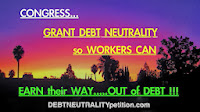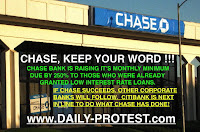Since Wall Street called a timeout last September, and with the Super Bowl right around the corner, I was wondering who will call a real time out for the american consumer? A real time out involves the suspension of interest charges on all unsecured debt, also known as Credit Card Debt.
I see Barack Obama madly spinning his wheels to try and inflate the american economy with a bicycle pump, and I find it embarrassing. Meanwhile, the made in China toy you purchased a couple of years ago is still on your credit card racking up obscene interest charges.
The toy that should have been made in the United States by an american, but instead was made in China, has now cost you MORE because of ongoing interest charges than if the toy had been made in the United States and you purchased it with cash! The net result is you bought a "cheaper" toy for more money than if it had been made in the United States, and no american labor was involved in the making the toy you bought, so that is one less wage earner in the United States to buy the products that your company makes. What doesn't go around, doesn't come around.
Being a great leader involves recognizing when your own actions are trivial compared to the will and power of the people. All Barack Obama has to do is waive the interest charges on all credit card debt for anyone trying to pay down their debts. Tie it in to a consumer debt reduction plan so that people don't just mindlessly run up even more debt, but actually get rewarded for paying down their debt, and you will see the economy come back to life all by itself.
Barack Obama talks about having spoken to people all over the country while running for president, yet you still think the men in suits have all the answers. The same people that gave themselves 18 billion dollars in bonuses from the bailout money you already handed them may not be the best source for solving the problem they helped create.
Friday, January 30, 2009
Tuesday, January 20, 2009
Hyundai tries to do the right thing, but it sure sounds weird.
Hyundai says bring your new car back if you lose your job within the first year.
Hyundai is running a television ad that if you lose your job, your license, have health issues or lose your source of income within the first year of buying your Hyundai car, you can return your new car purchase, without harming your credit history. Hyundai will cover you up to $7,500 dollars worth of negative equity, anything more than that and you have to pay the difference. Also, you have to have made at least two car payments.
This is all well and good, but what does it mean if Hyundai does not make this special offer? Does it really mean that a consumer should be labeled a "bad risk" because they lost their job and could not pay for the car? Should a consumer be labeled a "bad risk" if they have an ailing parent (as mentioned in the link above) that might cause a financial strain to take care of and cause the consumer to have to return a car?
Is being "forgiven" by the very businesses who in one way or another threw them under the bus over the past couple of decades by force feeding them things that in the long run were not viable the only way the american consumer can get a "break"?
How about an interest free debt paydown program so people can restart their economic lives over and not be indentured to the very entities willing to "forgive us" because we can't afford new debt.
Hyundai is running a television ad that if you lose your job, your license, have health issues or lose your source of income within the first year of buying your Hyundai car, you can return your new car purchase, without harming your credit history. Hyundai will cover you up to $7,500 dollars worth of negative equity, anything more than that and you have to pay the difference. Also, you have to have made at least two car payments.
This is all well and good, but what does it mean if Hyundai does not make this special offer? Does it really mean that a consumer should be labeled a "bad risk" because they lost their job and could not pay for the car? Should a consumer be labeled a "bad risk" if they have an ailing parent (as mentioned in the link above) that might cause a financial strain to take care of and cause the consumer to have to return a car?
Is being "forgiven" by the very businesses who in one way or another threw them under the bus over the past couple of decades by force feeding them things that in the long run were not viable the only way the american consumer can get a "break"?
How about an interest free debt paydown program so people can restart their economic lives over and not be indentured to the very entities willing to "forgive us" because we can't afford new debt.
Friday, January 2, 2009
Do the New Math, Less income, less spending, equals a bigger and bigger slice goes toward Interest Payments.
If person A has 1,000 dollars in bills, and 900 dollars in earnings, they must borrow a 100 dollars to break even, and on that 100 dollars they must pay interest. If Person A's income drops to 500 dollars, and they manage to drop their spending to 600 dollars, the net effect is they still must borrow a hundred dollars, but now the percentage of money they are borrowing versus the total amount they are making has DOUBLED.
The government and the banks probably realize that the fastest and most responsible way out of the projected worldwide economic downturn is to stop charging interest to anyone who is responsibly paying down their debts, otherwise, as income and expenses both decrease, the percentage each person is paying towards interest will continue to increase, and continue to strangle the masses.
So the bailout basically took all the money that the consumer lost in home equity, and gave it back to the banks, who in turn will charge interest on it before "sharing" it with the people who it was taken from.
The government and the banks probably realize that the fastest and most responsible way out of the projected worldwide economic downturn is to stop charging interest to anyone who is responsibly paying down their debts, otherwise, as income and expenses both decrease, the percentage each person is paying towards interest will continue to increase, and continue to strangle the masses.
So the bailout basically took all the money that the consumer lost in home equity, and gave it back to the banks, who in turn will charge interest on it before "sharing" it with the people who it was taken from.
Subscribe to:
Posts (Atom)










